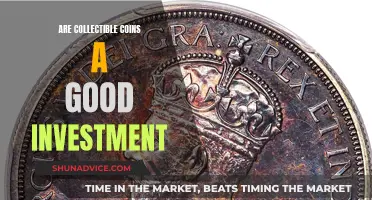
Gold has been a valuable commodity for thousands of years, and it continues to be a popular investment option today. Gold coins are one way to invest in gold, but there are advantages and disadvantages to this approach. On the one hand, investing in gold coins can provide a sense of satisfaction and solidity, especially when compared to the intangibility of modern investment methods. Gold also has a history of preserving wealth and acting as a hedge against inflation. On the other hand, gold coins come with risks of theft, no dividends or interest payments, and potentially high premiums and transaction costs. Additionally, the gold coin market can be volatile and unpredictable, and there may be concerns about the authenticity of the coins. Overall, while gold coins may be a good investment option for some, it is important to carefully consider the benefits and drawbacks before making any decisions.
| Characteristics | Values |
|---|---|
| Safe haven asset | Gold is a safe-haven asset during market downturns and economic uncertainty. |
| Hedge against inflation | Gold is a hedge against inflation. |
| Store of value | Gold is a store of value through market ups and downs. |
| Diversification | Gold can be used to diversify a portfolio. |
| No dividends or interest | Gold does not generate income through dividends or interest. |
| Capital gains tax | Gold is subject to higher capital gains tax rates compared to other investments. |
| Extra costs | Gold ownership incurs extra costs for storage, insurance, and transportation. |
| Liquidity | Gold has lower liquidity compared to other investments. |
| Volatility | Gold prices are volatile and fluctuate over short periods. |
| Correlation with other assets | Gold has a low correlation with stocks, bonds, and real estate. |
What You'll Learn

Gold coins can be expensive to buy
Gold coin manufacturers also charge fabrication fees and/or seignorage—a fee covering minting royalties. These costs are incurred when converting large bars into smaller articles, and they are passed on to the buyer. Neither seignorage nor fabrication adds lasting value to bullion products. In fact, raw bullion in Good Delivery form tends to fetch the highest bid prices.
Gold coins are also expensive to buy because of the high costs associated with coin dealers. Dealers suffer from highly variable demand, which routinely multiplies during financial stresses and then turns negative when the market is calm. This results in a cycle of shortage and then glut, leading to high prices or low prices at the time of maximum disadvantage to the majority of customers. When dealers are short of stock, they ration buyers by raising the price for immediate delivery, and only those willing to pay higher prices get their gold while the panic is on.
Storage and insurance costs can also make gold coins expensive to buy. While it is possible to store a small number of gold coins at home in a safe, larger quantities will likely require a safety deposit box, which can be expensive. Additionally, insurance fraudsters often target gold coins, as they are easily sold, which leads to higher insurance premiums for honest buyers.
Amazon Bitcoin: A Guide to Investing
You may want to see also

Gold coins can be expensive to store
It is not advisable to hide gold in your house unless you have a safe. Thieves know where to look or can use a metal detector to find it. Instead, consider renting a safe at a bank to keep your gold and other valuables.
Some companies offer gold storage services, but they can be costly. For example, The Gold Bullion Company offers free storage for the first six months, but after that, storage fees start at £9 (including VAT) per month. These fees are charged at 0.65% + VAT per annum of the insured value of the items.
The Royal Mint also offers gold storage services with no hidden charges, no minimum monthly fee, and zero vault extraction fees. However, their fees are charged at 1% + VAT per annum for coin tubes and larger gold bars based on the average daily market value of your total metal holdings. Single coin capsules and smaller bars are charged at 2% + VAT per annum.
Another option is to buy gold coins with your Individual Retirement Arrangement (IRA). The IRA administrator will keep the coins in a vault for you, but you won't be able to take them home.
A Beginner's Guide to Investing in Bitcoin on Robinhood
You may want to see also

Gold coins can be expensive to insure
Firstly, most standard homeowner's insurance policies have very low coverage limits for valuable items like gold coins. Typically, there is a maximum coverage limit of around $250 for items such as coins, banknotes, and numismatic-related items. This means that in the event of a loss, your policy may only cover a small fraction of the actual value of your gold coins.
To adequately insure your gold coins, you may need to purchase additional coverage or a separate policy. Some insurance companies offer floater policies, which cover any kind of loss, even those not typically covered by a homeowner's policy. A floater policy can provide broader coverage and a higher coverage limit, but it will require a professional appraisal of your gold coins.
Alternatively, you can consider using a safe deposit box at a bank to store your gold coins. However, it is important to note that the contents of safe deposit boxes are usually not insured by the bank or the Federal Deposit Insurance Corporation (FDIC). You would need to purchase separate insurance for the contents of the safe deposit box, which can be costly.
Another option is to use a private vault depository service, such as those offered by secure logistics companies like Brink's or G4S. These companies typically offer full insurance for items stored in their facilities through well-known third-party insurance firms. This option may be more cost-effective than insuring items stored in a safe deposit box at a bank.
When insuring gold coins, it is essential to insure them for their current market value. Underinsuring your coins can lead to insufficient coverage in the event of a loss. Additionally, it is crucial to keep a paper trail and documentation of your gold coins, especially if they are rare or collectible. This documentation can help prove ownership and value in the event of a claim.
In summary, insuring gold coins can be expensive, and it may require additional policies or the use of specialised storage and insurance services. It is important to carefully consider your options and choose the most suitable and cost-effective method for protecting your investment.
Smart Bitcoin Investment: How Much to Invest?
You may want to see also

Gold coins may be inauthentic
Counterfeit Coins
Counterfeit coins have a long history, with unscrupulous parties attempting to replicate and undermine the artisan's efforts. Today, counterfeiting most often occurs in the coin-collecting sector, with plagiarists trying to pass off their creations as valuable artefacts. Counterfeiters use advanced techniques to create coin dies that appear realistic, such as the spark erosion method, hand-engraving, using an engraving lathe, and electroless plating. These methods can be time-consuming and expensive, so most counterfeiters reserve them for the most valuable coins.
Doctored Counterfeits
Doctored counterfeits are the least expensive type of fake coins. This technique involves altering or doctoring a surface-level component on a fake coin to make it appear real. For example, adding a special US mint marking to make a coin seem more valuable. Another method is splitting, where counterfeiters take two coins, split them in half, and bond them back together to give them a different appearance.
Mould Counterfeits
Counterfeiters may make a mould of an actual coin and then use that mould to cast fake coins. They pour molten metal into the mould, allowing it to take the shape of the authentic coin. This method is popular as it maintains the value and appearance of the original coin. However, it is usually considered the least realistic and easiest to detect.
How to Spot Fake Coins
There are several ways to spot fake gold coins. Firstly, measure the coin's weight, thickness, and diameter. Fake coins may be lighter due to gold shaving. Secondly, gold is non-magnetic, so if a coin is attracted to a magnet, it likely contains trace elements of other metals like iron. Thirdly, examine the coin under a microscope or magnifying glass for surface features that don't match an authentic coin, such as different markings, letter shapes, or details on portraits. Finally, some at-home tests include the float test (real gold sinks in water), the ping test (gold makes a high-pitched ringing noise when struck), and the acid test (apply nitric or hydrochloric acid to an unobtrusive area; if it turns green or dissolves, it's not real gold).
ETN Coin: A Smart Investment Decision?
You may want to see also

Gold coins may be a poor investment in a crisis
Firstly, gold coins do not generate any income. Unlike stocks or bonds, gold coins do not provide dividends or interest payments. This means that the only way to make a profit from gold coins is through capital gains, which may not occur for years.
Secondly, gold coins carry additional costs and risks. If you physically own gold coins, you will need to store them securely and insure them against loss or damage. These costs can add up quickly and eat into any potential gains.
Thirdly, gold coins are subject to price volatility. The price of gold can fluctuate significantly over short periods, making it a risky investment, especially during a crisis when markets are turbulent.
Additionally, gold coins may not always provide the inflation hedge that investors expect. While gold is often seen as a safeguard against inflation, there is no guarantee that its price will increase along with inflation. In some cases, gold prices may even decline during periods of high inflation, as was seen in 2022.
Lastly, gold coins can be susceptible to fraud and scams. Dealers and brokers may take advantage of investors' fears and uncertainties, pushing them to buy gold coins at inflated prices. It is important for investors to be cautious and thoroughly research any gold investment opportunities.
In conclusion, while gold coins may have a place in a well-diversified portfolio, they may not be a good investment during a crisis due to their lack of income generation, additional costs, price volatility, uncertain inflation hedge, and potential for fraud.
Dogecoin Investment: Safe or Risky Bet?
You may want to see also







